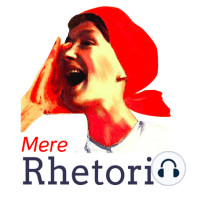7 min listen
Bootstraps--Victor Villanueva
FromMere Rhetoric
ratings:
Length:
14 minutes
Released:
Jul 13, 2016
Format:
Podcast episode
Description
Bootstraps, Victor Villanueva What does a rhetorician look like? When you imagine a rhetorician, maybe you see some white-toga-ed Roman, crossing his legs under his seat, holding a stylus to his chin. Or maybe you imagine a tweedy early twentieth century rhetorician, shaking out a newspaper and frowning. Or maybe you even imagine a contemporary rhetorician, presenting at the Rhetoric Society of America in front of a powerpoint presentation. But here’s a question for you--did you imagine a white rhetorician? Today on Mere Rhetoric, we talk about Victor Villanueva’s book Bootstraps: from an American Academic of Color, which interrogates our discipline’s white privilege and privileging. But before we get to that, let me start out by thanking some people. First off, much thanks to the Humanities Media Project at the University of Texas at Austin for supporting the show, including letting me record in this great recording booth with great people like Jacob here to record and edit. Also, thank you to everyone who took the time to leave a review of Mere Rhetoric on iTunes. Also thanks to my fiance Krystian for always believing in me. Know how you feel when you get written comments on end of semester evaluations? That’s how I feel everytime someone leaves a review. Finally, since I just came back from a conference where I got to meet some great people who like the podcast, I’d like to give a big shout out to Clancy Ratliff for showing me a great restaurant in Lafayette and her student Nolan, who let me jabber about the connections between creative writing and composition while he showed me where my next session was. If you have strong opinions about the best place to eat in your hometown, or if you have a suggestion for the next episode, why not drop us a line at mererhetoricpodcast@gmail.com? Okay, enough business--let’s get to it. I first became aware of the racial imbalance in rhetoric at my first RSA conference. Sharon Crowley was giving one of the key addresses, talking about racism in our students, in our institutions, and at one point I looked around at the audience--and wondered about racism in our own field as well. There were a few black and brown faces, but almost everyone in the great hall was white. We couldn’t, I realized, talk about racism in our classrooms and our colleges without interrogating our own racial assumptions. That’s exactly what Victor Villanueva sets out to do in Bootstraps. Villanueva is a hot shot rhetorician, by almost any standard possible. He’s received the David H Russell Award for Distinquished Research, the Exemplar Award and Scholarship in English and was Rhetorician of the Year in 1999. Side bar: I did not know there was an award for being Rhetorician of the Year. Somehow, I imagine a People Magazine spread like for Sexiest Man Alive, but with pictures of academics mid-gesture in a lecture or thoughtfully frowning at a computer. Villanueva has also published and edited over 80 books including the essential anthology Cross Talk in Composition and Rhetorics of the Americas: 3114 BCE to 2013 CE. Guy knows his stuff. When you are literally rhetorician of the year, you must be the quintessential rhetorician, confident and poised in your rhetoricianness. You’d think so. In Bootstraps, Puerto-Rico-born Villanueva weaves autobiography, scholarship and teacher research together into an exploration of how the academic world can seem uncomfortable and unwelcoming to academics of color. He himself, for his PhD and his 80 books, when he writes about himself in the third person “He still suffers [the fear that he isn’t as smart as he thinks] today, thirty years later, PhD, publications and all… He has seen the liberal’s fear of being honest with people of color about their abilities; the fear of being considered a bigot .. He has seen that tokenism, even when well-motivated, even though somehow necessary, makes things seem equitable when they aren’t equitable at all… he always wonders if, maybe,
Released:
Jul 13, 2016
Format:
Podcast episode
Titles in the series (99)
Isocrates' Encomium of Helen: Shownotes (transcript available upon request) Complaint that Gorgias has not written a true encomium, but an apologia--a defense. He only defended her actions as not her fault instead of saying what she was actually excellent at. Isocrates complains... by Mere Rhetoric
